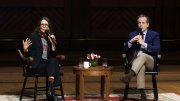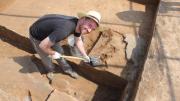Constitutional Redemption: Political Faith in an Unjust World, by Jack M. Balkin ’78, J.D. ’81 (Harvard, $35). The author, a professor at Yale Law School, turns from questions of constitutional theory and judicial review to public attitudes toward the “constitutional project,” and explores and critiques the “Great Progressive Narrative” that underlies Americans’ story about their basic law.
Big-Time Sports in American Universities, by Charles T. Clotfelter, Ph.D. ’74 (Cambridge, $29). Now a professor of economics, public policy, and law at Duke, Clotfelter takes advantage of that venue to explore his subject. Commercial athletics, he finds, has become a core function of the universities that host it—a fact “as unremarkable to most adults who were raised in this country as it must surely be strange to a first-time visitor from abroad.”
The Sorcerer’s Apprentices: A Season in the Kitchen at Ferran Adrià’s elBulli, by Lisa Abend, A.M. ’93, G ’99 (Free Press, $26). A journalistic look behind the scenes at the famous restaurant whose proprietor inspired the School of Engineering and Applied Sciences’ recent cooking class. You, too, can learn how to plate the artichoke rose.
Reasoning from Race: Feminism, Law, and the Civil Rights Revolution, by Serena Mayeri ’97 (Harvard, $39.95). An examination of the connections between race and sex equality, civil rights and feminism—from Jim Crow to “Jane Crow”—by an assistant professor of law and history at the University of Pennsylvania Law School. Mayeri was a Ledecky Undergraduate Fellow at this magazine.
The Deal from Hell, by James O’Shea Harvard Kennedy School Fellow ’86 (PublicAffairs, $28.99). The former managing editor of the Chicago Tribune and editor of the Los Angeles Times details the disastrous merger of those enterprises, and the even more destructive leveraged buyout of the Tribune Company, during troubled times for journalism. Useful background on the Nieman Foundation’s new curator, Ann Marie Lipinski (see "University People"), another Tribune veteran (and casualty).
Nancy Holt: Sightlines, edited by Alena J. Williams ’98 (California, $49.95). A young curator (still a doctoral student at Columbia) presents, with others, a comprehensive look at the work of a monumental sculptor (Sun Tunnels) and installation artist who has also worked in photography, video, and film.
Near Andersonville: Winslow Homer’s Civil War, by Peter H. Wood ’64, Ph.D. ’72 (Harvard, $18.95). A close reading of a rediscovered Civil War painting by Homer reveals deep meanings about the conflict, slavery, and race—from an enslaved black’s perspective. The Nathan I. Huggins Lectures, delivered by the professor of history emeritus at Duke.
Strange New Worlds: The Search for Alien Planets and Life beyond Our Solar System, by Ray Jayawardhana Ph.D. ’00 (Princeton, $24.95). A readily accessible account of the increasingly successful search for other planets, by a University of Toronto astrophysicist (and 2011-12 Radcliffe Institute fellow).
Divine Art, Infernal Machine, by Elizabeth L. Eisenstein, Ph.D. ’53 (Pennsylvania, $45). A history, for our digital age, of the ambivalent attitudes toward printing and printers, beginning with the conflation of Gutenberg’s partner, Johann Fust, with the necromancer “Doctor” Johann Georg Faustus. The author is professor of history emerita at the University of Michigan.
Modernist America: Art, Music, Movies, and the Globalization of American Culture, by Richard Pells, Ph.D. ’69 (Yale, $35). America exports, and shapes, world culture—but the movement is reciprocal, as Pells, professor of history at the University of Texas at Austin, comprehensively demonstrates in this scholarly work. For instance, he notes, Aaron Copland, D.Mus. ’61, George Gershwin, and Leonard Bernstein ’39, D.Mus. ’67, followed Picasso, Duchamp, and Stravinsky in “intermingling elements from high and low culture, combining the sacred and the profane.”
A Reforming People: Puritanism and the Transformation of Public Life in New England, by David D. Hall ’58, Bartlett Research Professor of New England church history (Knopf, $29.95). We think of our Puritan forebears as, well…Puritan, conservative. In fact, the founders of New England created “churches, civil governments, and a code of laws” that marked them as “the most advanced reformers of the Anglo-colonial world.”
The People’s Republic of China at 60, edited by William C. Kirby, Chang professor of China studies and Spangler Family professor of business administration (Harvard Asia Center/Harvard University Press, $29.95 paper). Conference proceedings featuring a stellar lineup of expert China scholars (many from Harvard’s faculties) on the country that has, for example, been on an increasingly accelerated march from 83 percent rural (in 1949) to two-thirds urban within the foreseeable future, with all that entails.








